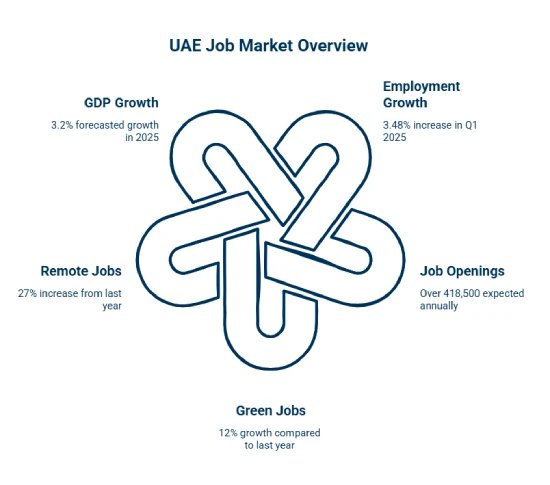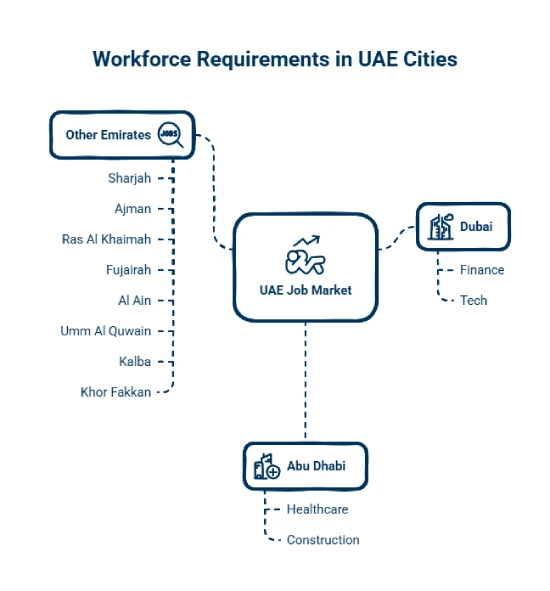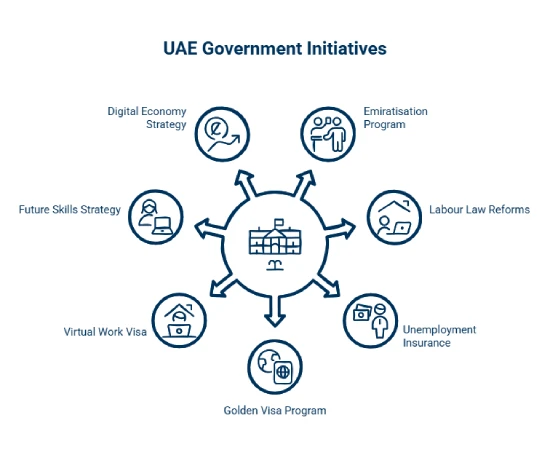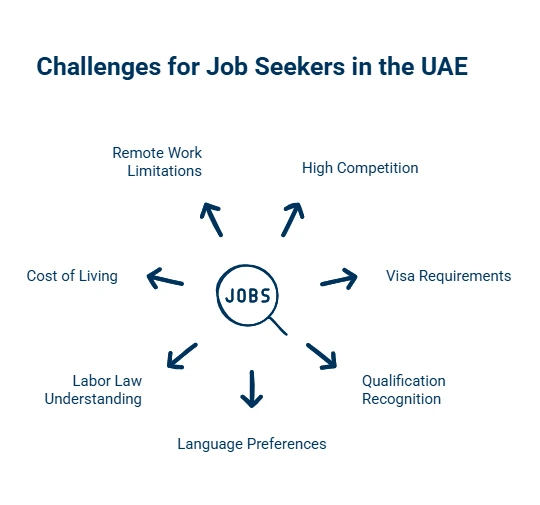
The UAE job market is on the rise in 2025, thanks to a mix of economic growth, investments in tech, and big infrastructure projects. There is a solid need for skilled workers, especially in areas like healthcare, tech, education, and renewable energy. The government’s Emiratization efforts and Vision 2031 are also impacting hiring trends. Plus, more companies are hiring remotely or using gig workers, which is changing the way they find talent. The UAE continues to attract expatriates, with benefits like a tax-free salary and global job options.
Here are some main points affecting the UAE job scene in 2025:
*Want to work in the UAE? Let Y-Axis guide you with the process.
The UAE’s economy is rapidly growing, leading to a major demand for skilled workers in areas like healthcare, IT, construction, and finance. With plans like Vision 2031 and investments in smart infrastructure, there are more job opportunities, especially in roles that help with digital services and public services.
| Occupation | Average annual salary |
| IT and Software | AED 192,000 |
| Engineering | AED 360,000 |
| Accounting and Finance | AED 330,000 |
| Human Resource Management | AED 176,000 |
| Hospitality | AED 286,200 |
| Sales and Marketing | AED 131,520 |
| Healthcare | AED 257,100 |
| STEM | AED 222,000 |
| Teaching | AED 192,000 |
| Nursing | AED 387,998 |
Read more…
Top in-demand occupations in the UAE
The job needs in the UAE change from one emirate to another. Places like Dubai and Abu Dhabi are at the forefront, creating jobs in areas like finance, healthcare, construction, and tech. The fast growth, foreign investments, and government projects have all helped keep the job market strong, especially in new industries and building efforts.
The table below has the list of top 10 cities in the UAE along with the average salary offered and the employment growth rate:
| City | Average Annual Salary (AED) | Employment Growth Rate |
| Dubai | 2,40,000 | 3.20% |
| Abu Dhabi | 2,28,000 | 2.90% |
| Sharjah | 1,80,000 | 2.40% |
| Ajman | 1,60,000 | 2.10% |
| Ras Al Khaimah | 1,70,000 | 2.20% |
| Fujairah | 1,50,000 | 1.80% |
| Al Ain | 1,65,000 | 2.00% |
| Umm Al Quwain | 1,45,000 | 1.70% |
| Kalba | 1,40,000 | 1.60% |
| Khor Fakkan | 1,38,000 | 1.50% |

The UAE is working on becoming more focused on knowledge and innovation, and because of that, employers are looking for people who have both technical skills and soft skills. Right now, the skills that are most needed are related to digital change, business growth, and the expanding healthcare and finance industries.
Given below is a breakdown of the skills that are in high demand now:
| Technology Skills | Marketing Skills | Finance & Accounting Skills | Healthcare Skills | Leadership & Communication Skills |
| Artificial Intelligence & Machine Learning | Digital Marketing & SEO | Financial Analysis & Risk Management | Clinical Research & Patient Care | Strategic Planning & Decision-Making |
| Cybersecurity & Ethical Hacking | Content Creation & Copywriting | Taxation & Compliance | Health Informatics & Telemedicine | Cross-Cultural Communication |
| Data Science & Analytics | Social Media Management | Budgeting & Forecasting | Medical Technology & Equipment Handling | Team Leadership & Conflict Resolution |
| Cloud Computing & DevOps | CRM Tools (e.g., Salesforce) | Auditing & Internal Controls | Emergency & Critical Care | Negotiation & Stakeholder Management |
| Blockchain Development | Brand Management & PR | Financial Reporting Standards (IFRS) | Pharmaceutical Knowledge | Emotional Intelligence & Adaptability |
Remote work has really taken off in the UAE, especially after the changes brought on by the pandemic. To meet the need for more flexible work setups, the UAE government introduced the Virtual Work Residence Visa. This allows foreign workers to live in the UAE and work remotely for companies based abroad. It shows how the country is looking to support digital growth and bring in talent from around the world. A 2024 survey by Bayt.com found that more than 70% of professionals in the UAE prefer either hybrid or fully remote jobs, with fields like tech, marketing, and consulting being the most popular for remote work.
Businesses in the UAE are getting on board with hybrid work models thanks to better digital tools and cloud services. Cities like Dubai and Abu Dhabi are becoming popular spots for remote work because of their quality of life, safety, and good connections to the world. Co-working spaces are booming too, with a 12% increase in demand for shared offices. All of this shows that the UAE is serious about preparing for the future and staying competitive as a global job market.
*Want to migrate to the UAE? Sign up with Y-Axis for complete immigration assistance!
The UAE government has rolled out several key policies and programs designed to improve workforce development, attract talent from abroad, and diversify the economy. These actions support the UAE Vision 2030 and show the country's focus on preparing its labor market for the future.
Here’s a look at some important initiatives:

The UAE has a solid work environment that's friendly to employees, with labor laws in place to make sure everyone, whether local or international, is treated fairly and kept safe. Workers here can access a good variety of benefits to help with both their careers and personal lives.
Here are some key benefits for employees in the UAE:
The UAE has a lively job market and attracts talent from all over the globe. While there is no shortage of job openings in different fields, those looking for work from outside the country might encounter some specific challenges.
Some of the most common challenges for job seekers in the UAE are as follows:

Finding a job in the UAE can be tricky, especially if you are coming from abroad. The job scene is competitive and always changing, so knowing what employers want and keeping up with market trends can really help.
Here are some tips to boost your chances:
*Finding it difficult to keep your resume up-to-date? Avail Y-Axis Resume Writing Services to get personalized assistance!
The job market in the UAE is steady, thanks to efforts like the UAE Vision 2031 and the Emiratisation programs. Recently, there have been over 400,000 job openings, especially in fields like healthcare, IT, construction, education, and finance. The unemployment rate is low at 2.75%. New trends, such as remote work and flexible visas, are changing how people look for jobs. With good salaries, tax-free income, and plenty of opportunities in both public and private sectors, the UAE is still a great place for skilled workers from around the world.
*Are you looking for step-by-step assistance with overseas Immigration? Contact Y-Axis, the leading visa and immigration consultancy in Canada!
Explore what Global Citizens have to say about Y-Axis in shaping their future
Canada PR Visa
Sameer got Permanent Resident Visa for C
Read More...
Canada Work Permit Visa
Varun provided us with great Y-Axis Revi
Read More...
Canada PR Visa
One of our client Virendra availing his
Read More...
The UAE's job market is growing fast. In 2025, the workforce has grown by about 3.5% in the first quarter, and it's expected to keep expanding thanks to investments in areas like tech, healthcare, and renewable energy. As of mid-2025, the labor market looks good, with around 418,500 new job openings expected each year. Healthcare, IT, construction, and finance are really driving this growth.
Looking ahead, the UAE is working on diversifying further, with plans like the National Artificial Intelligence Strategy and Vision 2030. These efforts will open up more job opportunities in fields like AI, green energy, and advanced manufacturing.
Right now, there is a strong demand for digital skills in the UAE. There is also a big increase in remote and hybrid job options, hybrid roles have shot up by 84% in 2025, showing how work is changing.
The top in-demand jobs in the UAE are as follows:
The unemployment rate in the UAE is pretty low, estimated at 3.1%, while the employment rate is looking healthy at about 76.4%, offering plenty of job opportunities.
The job market in the UAE is booming, especially in some of the key areas.
Here are a few roles that most employers in the UAE are looking for:
· AI and Machine Learning Specialists: With the UAE aiming to be a leader in innovation, there is a huge need for these experts.
· Healthcare Professionals: There is a growing demand for doctors, nurses, and lab techs thanks to the expansion in healthcare services.
· Cybersecurity Experts: As more businesses go digital, they need security pros to keep everything safe.
· Financial Analysts and Accountants: The rise of financial services and Fintech means there is a big need for finance experts.
· Software Developers and IT Engineers: The push for a digital economy is creating a lot of tech jobs in the region.
Note: These positions are hot right now not just for their skills, but also because they fit well with the country’s goals for a diverse and sustainable economy.
On average, people in the UAE make around AED 20,000 a month (about USD 5,445). Pay can vary a lot by industry and experience—financial analysts make between AED 16,000 and 25,000 monthly, while CFOs can earn up to AED 90,000.
Recently, the UAE has become the first country to bring an AI system into its cabinet, using it as an advisor in governance. The government is also ramping up its Emiratisation efforts to have 50-60% of jobs in the insurance sector held by Emiratis by 2030.
Around 92% of Dubai’s population are expatriates, totalling around 3.5 million people, highlighting the UAE’s role as a hotspot for international talent across various sectors.
Key industries driving employment include oil and gas, construction, technology, healthcare, finance, tourism, and renewable energy.
Employers seek professionals skilled in AI, data analytics, digital marketing, project management, healthcare, and renewable energy engineering.
Dubai, Abu Dhabi, and Sharjah are leading employment hubs, offering opportunities across tech, real estate, banking, education, and logistics.
Popular visa categories include employment visas, Green Visas for skilled professionals, and Golden Visas for investors, entrepreneurs, and highly skilled individuals.
International candidates can apply through UAE-based job portals (Bayt, Naukrigulf, LinkedIn), recruitment agencies, or directly via company career websites.
Roles in fintech, sustainability, artificial intelligence, healthcare, and logistics are expanding quickly due to national development initiatives like UAE Vision 2031.
The UAE’s tax-free income and modern infrastructure make it one of the most attractive destinations for expatriate professionals worldwide.
Workplaces are multicultural and professional, with an emphasis on respect, efficiency, and collaboration. Many organizations now offer hybrid or flexible working options.
High competition, visa sponsorship requirements, and preference for locally experienced candidates can be obstacles. However, networking and region-specific qualifications help overcome these.
Building a strong LinkedIn presence, obtaining certifications relevant to the UAE market, and targeting employers who sponsor expatriates improve hiring prospects.